Featured
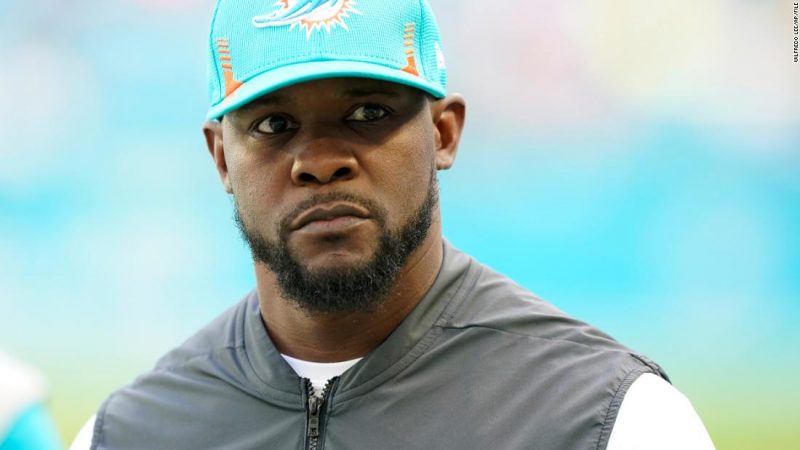 Here are some of the notable passages in Brian Flores’ lawsuit against the NFL By Steve Almasy / CNN
Here are some of the notable passages in Brian Flores’ lawsuit against the NFL By Steve Almasy / CNN
Former Miami Dolphins coach Brian Flores initiated a federal class-action lawsuit Tuesday, alleging the NFL still discriminates against Black candidates for head coaching and other positions. The 58-page document names the league and three teams — the Dolphins, the New York Giants and the Denver Broncos — as defendants and the remaining 29 teams as John Does. The document castigates the culture of the NFL and the Rooney Rule, which requires teams to interview two external minority candidates for head coaching positions. The lawsuit says the rule hasn’t worked to increase hiring of coaches of color. The suit accuses the Giants of interviewing Flores, who is Black, for a head coaching job after the team decided to hire Brian Daboll so it would be in compliance with the Rooney Rule. Read more
Political / Social
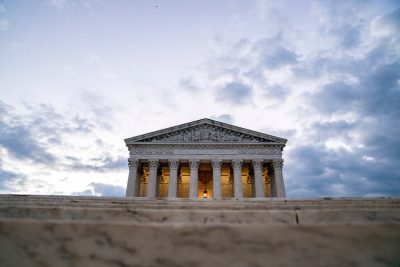 When All-White Was All Right. By Charles M. Blow / NYT
When All-White Was All Right. By Charles M. Blow / NYT
Nominating Supreme Court justices has always been about identity and politics. It’s just that for nearly the first two centuries of the court’s existence, the only people considered for inclusion were white men. When it comes to power, white and male are silent, like the “u” in disguise. In this country, white men are the presumptive base of power from which everyone else is a deviation. They are the norm against which all others are judged to be anomalous. Read more
Related: The Smear Campaign Against Biden’s Not-Yet-Named Nominee. by Adam Serwer / The Atlantic
Related: The Supreme Court does not come close to representing the country. By Zachary B. Wolf / CNN
Related: Republicans Weigh How Forcefully to Fight a Black Female Court Nominee. By Carl Hulse / NYT
 Trump escalates racist rhetoric at recent rallies and plays on white grievance. By Domenico Montanaro / NPR
Trump escalates racist rhetoric at recent rallies and plays on white grievance. By Domenico Montanaro / NPR
With former President Donald Trump off mainstream social media, his messages aren’t as ubiquitous. It makes it harder for them to break through. But in recent rallies and statements, Trump has seemed to escalate a message rooted in racism and lies. Trump alleged during a rally in Texas over the weekend that Black prosecutors investigating him are “racist,” and he is again flirting with mob violence, calling for mass protests if they do anything he deems to be “wrong or illegal.” Read more
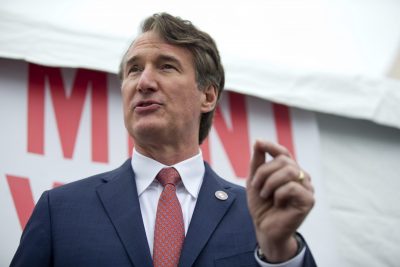 Glenn Youngkin’s No-Guilt History of Virginia for Fragile White People. By Dana Milbank / Wash Post
Glenn Youngkin’s No-Guilt History of Virginia for Fragile White People. By Dana Milbank / Wash Post
How would history sound denuded of anything potentially distressing for White kids? We don’t have to guess, because we’ve already been there. I have an actual 7th-grade textbook used in Virginia’s public schools from the 1950s through the 1970s — when Virginia began moving toward the current version of history: the truth.
“A feeling of strong affection existed between masters and slaves in a majority of Virginia homes. … It was to [the master’s] own interest to keep his slaves contented and in good health. If he treated them well, he could win their loyalty and cooperation. … The intelligent master found it profitable to discover and develop the talents and abilities of each slave. … The more progressive planters tried to promote loyalty and love of work by gifts and awards.” Read more
Related: School Boards Have Long Been a Tool of White Supremacy. By Anthony Conwright / Mother Jones
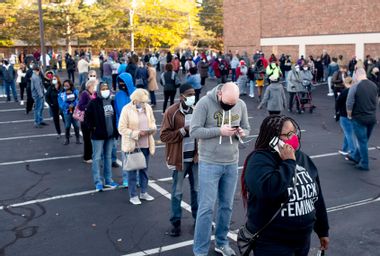 Mitch McConnell’s moment of truth: For many whites, Black people aren’t real “Americans.” By Chauncey Devega / Salon
Mitch McConnell’s moment of truth: For many whites, Black people aren’t real “Americans.” By Chauncey Devega / Salon
Last week, in response to a reporter’s question about the John Lewis Voting Rights Advancement Act, Senate Minority Leader Mitch McConnell said: “If you look at the statistics, African American voters are voting in just as high a percentage as Americans.” Contrary to what some would prefer like to claim, this was not a gaffe or a clumsy misstatement. McConnell spoke his personal truth. As powerful white men so often do, he told on himself. Indeed, why should this surprise anyone? McConnell has shown through his behavior and words, and more importantly through the public policies and laws he has supported and advanced, that these are his deeply held and sincere beliefs. Read more
Related: Can Democrats Win When They Talk About Race? By Jane Coaston / The Argument NYT Podcast
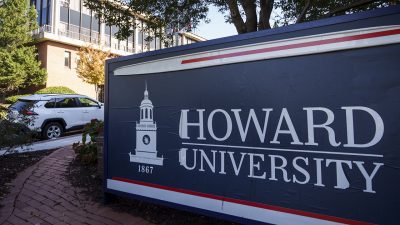 Bomb Threats Made To Historically Black Schools Across U.S. By AP and HuffPost
Bomb Threats Made To Historically Black Schools Across U.S. By AP and HuffPost
At least six historically Black universities were responding to bomb threats Monday, with many of them locking down their campuses for a time.
At least a half-dozen historically Black universities in five states and the District of Columbia were responding to bomb threats Monday, with many of them locking down their campuses for a time. In warnings to students, school officials say some of the threats were directed at academic buildings. Albany State University warned students and faculty on social media that “a bomb threat has been issued to Albany State University’s academic buildings.” Read more
 Georgia’s Stacey Abrams raised $9.25 million in governor bid. By AP and ABC News
Georgia’s Stacey Abrams raised $9.25 million in governor bid. By AP and ABC News
Georgia Democrat Stacey Abrams says her campaign for governor raised more than $9.25 million since she announced her candidacy, and she still has $7.2 million in cash on hand.
Georgia Democrat Stacey Abrams announced Wednesday that her campaign for governor raised more than $9.25 million from more than 100,000 separate donors since she announced her candidacy on Dec. 1. Abrams said she has $7.2 million in cash on hand. That’s less than the $12.7 million that Republican Gov. Brian Kemp said Tuesday that he has in cash. But Abrams has a one key advantage: She’s thus far unopposed for the Democratic nomination, with no other candidates having yet filed. Read more
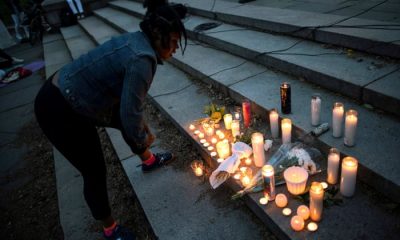 Black communities are most victimized by gun violence. Too often it’s assumed we are to blame. By Gregory Jackson Jr. / The Guardian
Black communities are most victimized by gun violence. Too often it’s assumed we are to blame. By Gregory Jackson Jr. / The Guardian
When I was shot, I was interrogated as if I were the guilty party. All people saw was a Black man with a gunshot wound who was in the wrong neighborhood.
When people of color are involved in acts of gun violence, the assumption is we are to blame. We are living in the wrong neighborhood, or the violence was result of criminal activity. However, it is our communities that are most affected and harmed by these tragedies. This past year we have seen a significant rise in shootings nationwide – an increase that disproportionately affects majority-minority communities like mine. Read more
 Anti-Asian hate crimes increased 339 percent nationwide last year, report says. By Kimmy Yam / NBC News
Anti-Asian hate crimes increased 339 percent nationwide last year, report says. By Kimmy Yam / NBC News
New research released Monday finds that hate crimes targeting the Asian American community have reached some unprecedented levels. The compilation of hate crime data, published by the Center for the Study of Hate and Extremism, revealed that anti-Asian hate crime increased by 339 percent last year compared to the year before, with New York, San Francisco, Los Angeles and other cities surpassing their record numbers in 2020. The significant surge is part of an overall 11 percent increase in suspected hate crimes reported to police across a dozen of America’s largest cities. Read more
 Cervical cancer kills Black women at a disproportionately higher rate than whites. By Alana Wise / NPR
Cervical cancer kills Black women at a disproportionately higher rate than whites. By Alana Wise / NPR
For many women, cervical cancer — while scary — is largely preventable, and if caught early, has a five-year survival rate of over 90%. Despite the usually favorable prognosis, an estimated 4,290 U.S. women died of cervical cancer in 2021. Black women, like Williams, are more likely to have a late-stage diagnosis of the disease and are almost one-and-a-half times more likely to die of cervical cancer than white women, according to a joint report by the Southern Rural Black Women’s Initiative for Economic and Social Justice (SRBWI) and Human Rights Watch (HRW). The study, based in rural Georgia, found “glaring racial disparities” in cervical cancer deaths at a rate that only worsened with age. Read more
 What the SAT’s waning relevance really tells us. By Nicole Hemmer / CNN
What the SAT’s waning relevance really tells us. By Nicole Hemmer / CNN
That waning relevance is not just about the SAT, but the broader struggles that universities face as they attempt to admit and prepare a more diverse student body for a more precarious economy. It is a challenge that universities themselves have struggled with just as much as the College Board. Some argue that now is the time to do away with the SAT completely. A seemingly neutral measure of college preparedness, the test has long been embedded with all sorts of biases based on class, race and culture. Part of that was tied to the history of the test itself. The SAT emerged from the new IQ tests developed for the military during World War I. Those tests, though implemented as an objective assessment of intelligence, were freighted with racial, cultural and nativist biases. Read more
 California could pay Black Americans reparations after 2023. By Orlando Mayorquin / USA Today
California could pay Black Americans reparations after 2023. By Orlando Mayorquin / USA Today
Supporters of a federal effort to study reparations for Black Americans are closely watching an ongoing debate in California over how to address the wrongs of history and dismantle racist structures. California is the first state in the nation to seriously consider some form of reparations for Black Americans. The California Reparations Task Force is made up of academics, lawyers, civil rights leaders, lawmakers and other experts convened by Gov. Gavin Newsom and is tasked with studying the state’s role in perpetuating the legacy of slavery. The task force is expected to recommend proposals to the Legislature by next year. Read more
 Black neighborhoods at risk as climate change accelerates flooding. By Patrick Galey / NBC News
Black neighborhoods at risk as climate change accelerates flooding. By Patrick Galey / NBC News
People walk along a flooded street after the passing of Hurricane Irma in North Miami, Fla, on Sept. 11, 2017.
Black communities will be disproportionately saddled with billions of dollars of losses because of climate change as flooding risks grow in the coming decades, according to research published Monday. The annual cost of flooding across the U.S. will hit $40 billion annually by 2050, compared with $32 billion currently. The study said that while today it is mainly white, poor constituencies who are in the firing line, in future predominantly Black communities will be the worst hit. Read more
 Leonard Peltier is America’s longest-held Indigenous prisoner. He should be freed. By Janene Yazzie and Nick Estes
Leonard Peltier is America’s longest-held Indigenous prisoner. He should be freed. By Janene Yazzie and Nick Estes
Peltier, the longest-held Indigenous political prisoner in the United States, is facing a potentially life-threatening situation. He is an elderly Anishinaabe and Dakota man who suffers from several serious underlying conditions: his age, diabetes, hypertension, heart condition and abdominal aneurism make his health precarious in prison without Covid-19 – and ever more dire with it. Peltier’s co-defendants were found not guilty by reason of self-defense for the 1975 killing of two FBI agents in Oglala on the Pine Ridge Indian Reservation in South Dakota during a shootout with members of the American Indian Movement. Read more
Ethics / Morality/ Religion
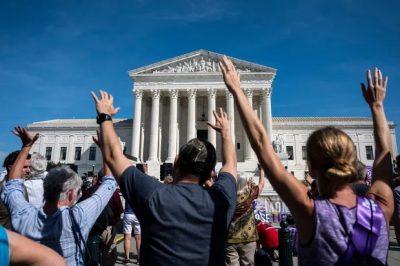 The Supreme Court’s Christian conservative revolution is upon us. By Ian Millhiser / Vox
The Supreme Court’s Christian conservative revolution is upon us. By Ian Millhiser / Vox
Almost as soon as Justice Barrett was confirmed, the Court handed down a revolutionary “religious liberty” decision. It hasn’t slowed down since.
Justice Amy Coney Barrett had been a member of the Supreme Court for less than a month when she cast the key vote in one of the most consequential religion cases of the past century. Months earlier, when the seat she would fill was still held by Justice Ruth Bader Ginsburg, the Court had handed down a series of 5-4 decisions establishing that churches and other houses of worship must comply with state occupancy limits and other rules imposed upon them to slow the spread of Covid-19. Read more
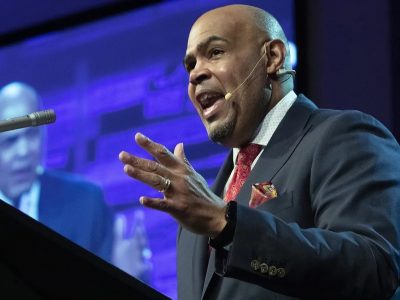 First African American picked for key Southern Baptist Convention post. AP and NPR
First African American picked for key Southern Baptist Convention post. AP and NPR
Tennessee pastor Willie McLaurin has been named interim president and CEO of the Southern Baptist Convention’s Executive Committee, becoming the first African American to lead one of the denomination’s ministry entities in its more than 175-year history.
McLaurin’s appointment as one of the top administrators for the largest Protestant church body in the United States was announced Tuesday in Baptist Press, an official SBC news outlet. He will lead the day-to-day business of the committee, which acts on behalf of the convention when it is not holding its annual two-day national gathering in June. Read more
 Josephine Baker’s life asks Catholics to imagine new ways to respect all — especially Black women. By Patrick Saint-Jean / NCR
Josephine Baker’s life asks Catholics to imagine new ways to respect all — especially Black women. By Patrick Saint-Jean / NCR
Last November, Josephine Baker, a 20th-century civil rights activist and entertainer, was the first Black woman — and the first American — to be inducted into the French Pantheon. And while her life and work has not been honored in a similar way in the United States, Americans, especially Catholics, have a lot to learn from Baker. Today, nearly 50 years after her death, Josephine has a message for us as American Catholics: Her life asks us to examine the road we’ve taken and challenges us to consider where we want to go in the future. Read more
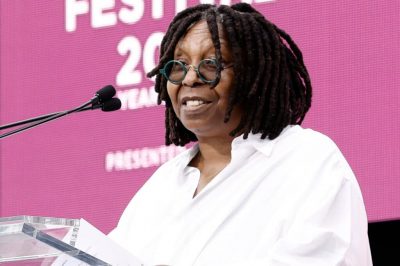 ABC Suspends Whoopi Goldberg Over Holocaust Comments. Jenny Gross and / NYT
ABC Suspends Whoopi Goldberg Over Holocaust Comments. Jenny Gross and / NYT
In the episode, Ms. Goldberg said the Holocaust was about “man’s inhumanity to man” and “not about race.” When one of her co-hosts challenged that assertion, saying the Holocaust was driven by white supremacy, Ms. Goldberg said, “But these are two white groups of people.” She added, “This is white people doing it to white people, so y’all going to fight amongst yourselves.” As she continued to speak, music came on, indicating a commercial break. Read more
Related: The New Wave of Holocaust Revisionism.
Historical / Cultural
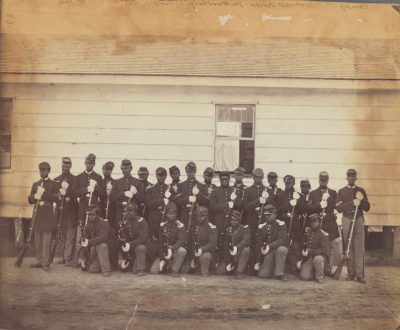 The Racial Politics of Demobilizing USCT Regiments. By Holly A. Pinheiro, Jr / AAIHS
The Racial Politics of Demobilizing USCT Regiments. By Holly A. Pinheiro, Jr / AAIHS
Company of colored troops, 1865 (Courtesy of the New York Public Library)
On April 9, 1865, Robert E. Lee (commander of the Confederate States Army) formally surrendered to Ulysses S. Grant (commander of the U.S. Army). The event not only reshaped American history, but it remains a widely depicted historical event for officially recognizing the end of the Civil War. Many people either ignore or remain unaware that numerous United States Colored Troops (USCT) regiments, including the Eighth United States Colored Infantry (USCI) and the 127th USCI, assisted in chasing Lee’s forces to Appomattox, Virginia. Some people may not know that those USCT regiments were present at Lee’s surrender. Read more
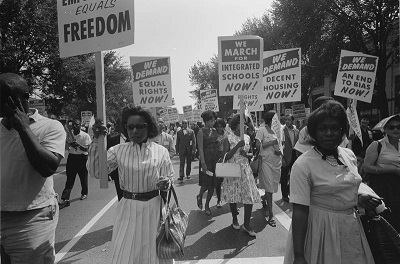 The story behind Black History Month — and why it’s celebrated in February. By Jonathan Franklin / NPR
The story behind Black History Month — and why it’s celebrated in February. By Jonathan Franklin / NPR
Every February, the U.S. honors the contributions and sacrifices of African Americans who have helped shape the nation. Black History Month celebrates the rich cultural heritage, triumphs and adversities that are an indelible part of our country’s history. “There is no American history without African American history,” said Sara Clarke Kaplan, executive director of the Antiracist Research & Policy Center at American University in Washington, D.C. The Black experience, she said, is embedded in “everything we think of as ‘American history.’ Read more
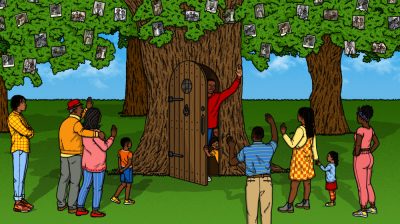 Family trees fill in the gaps for Black people seeking their ancestral roots. By Curtis Bunn / NBC News
Family trees fill in the gaps for Black people seeking their ancestral roots. By Curtis Bunn / NBC News
Jackson’s story underscores the surge in Black people using various means to increase their connection to family members who came before them as a way of bolstering their identity. The discovery of bloodlines generates a sense of self that can be profound — and can even alter how Black people look at themselves, Jackson said. The increase in Black people searching for relatives is illustrated in the rapid growth of the Facebook page Our Black Ancestry, which has grown to nearly 36,000 members in seven years. The interest in genealogy has become so prevalent that last year Ancestry.com released, free of charge, more than 3.5 million records of previously enslaved Black people, documents obtained from Freedman’s Bureau, a federal agency created in 1865 toward the end of the Civil War. Read more
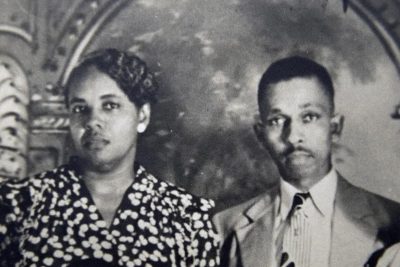 Remembering Harry T. Moore, a forgotten fighter for civil rights. By Greg Allen / NPR
Remembering Harry T. Moore, a forgotten fighter for civil rights. By Greg Allen / NPR
Seventy years ago, one of the first civil rights leaders of the modern era was killed in a bombing in Florida. Harry T. Moore isn’t as well known as civil rights icons Medgar Evers or Martin Luther King Jr. Moore’s activism began earlier, in the 1930s. His work in Florida investigating lynchings and registering African Americans to vote cost him his life. He lived and carried out his work from his home in Mims, a small town on Florida’s Atlantic coast, where he lived with his wife, Harriette Moore, and two daughters. Today, it’s home to the Harry T. & Harriette V. Moore Cultural Complex. Read more
 Lorraine Hansberry was ahead of her time. By Wendy Smith / Wash Post
Lorraine Hansberry was ahead of her time. By Wendy Smith / Wash Post
A new biography by Charles J. Shields delves into the playwright’s politics
Years before anyone used the term “intersectionality,” Lorraine Hansberry (1930-1965) saw, wrote and spoke about the ways class, race and gender discrimination were intertwined in the United States. Unsurprisingly, there’s been a resurgence of interest in her in recent years, with increasing attention paid to Hansberry’s journalism and political activism, in addition to her best-known achievement, the play “A Raisin in the Sun.” Charles J. Shields’s Hansberry biography is the third in little more than three years. Read more
 My Young Mind Was Disturbed by a Book. It Changed My Life.
My Young Mind Was Disturbed by a Book. It Changed My Life.
When I was 12 or 13 years old, I was not prepared for the racism, the brutality or the sexual assault in Larry Heinemann’s 1977 novel, “Close Quarters.”Mr. Heinemann, a combat veteran of the war in Vietnam, wrote about a nice, average American man who goes to war and becomes a remorseless killer. In the book’s climax, the protagonist and other nice, average American soldiers gang-rape a Vietnamese prostitute they call Claymore Face. As a Vietnamese American teenager, it was horrifying for me to realize that this was how some Americans saw Vietnamese people — and therefore me. I returned the book to the library, hating both it and Mr. Heinemann. Here’s what I didn’t do: I didn’t complain to the library or petition the librarians to take the book off the shelves. Read more
Related: Meet the moms of color from Texas fighting book bans at their kids’ schools. By Tat Bellamy-Walker / NBC News
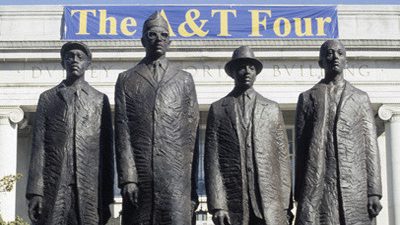 A&T Four is more than a monument, it’s a moment that changed the world. By Alexis Davis / The Undefeated
A&T Four is more than a monument, it’s a moment that changed the world. By Alexis Davis / The Undefeated
Feb. 1 is the 62nd anniversary of the historic sit-in at the segregated Woolworth’s lunch counter by four students
North Carolina A&T State University’s kickoff to Black History Month varies from typical events at other historically Black colleges and universities (HBCUs). This year, N.C. A&T’s annual February One commemoration celebrates the 62nd anniversary of the A&T Four. On Feb. 1, 1960, freshmen David Richmond, Franklin McCain, Joseph McNeil and Ezell Blair Jr. (now Jibreel Khazan) sat at F.W. Woolworth’s whites-only lunch counter in Greensboro to protest segregation. The February One Monument is an important landmark on A&T’s campus that sets it apart from other institutions. The four courageous freshmen who conducted the sit-in, which was the catalyst for similar sit-ins nationwide, are portrayed in bronze, depicted in similar clothing they wore that day. The monument includes a summary of the sit-in. Read more
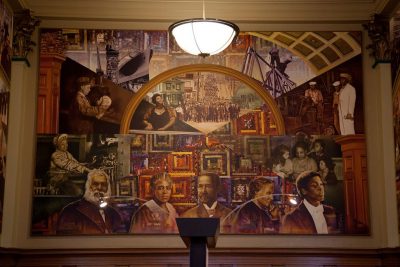 A Review of 2021 Books in Black Intellectual History. By Robert Greene II / AAIHS
A Review of 2021 Books in Black Intellectual History. By Robert Greene II / AAIHS
African American Museum Oakland Library, July 28, 2012 (Wikimedia Commons)
The following list is a sampling of books on African American history that were released during 2021. All of them have some tie to the broad genre of Black intellectual history—and also showcase the diversity of topics, themes, and methodologies within that field. Read more
 Sundance Film Festival Brings Racial Justice to the Big Screen. By Asher Luberto / The Progressive
Sundance Film Festival Brings Racial Justice to the Big Screen. By Asher Luberto / The Progressive
The largest since 2018, this year’s film festival offered many must-watch political films.
With eighty-two features, the 2022 Sundance Film Festival is the largest since 2018, and many of this year’s films are worth a watch. Here are three standout films with a political bent: Emergency, directed by Carey Williams, starts out like any other college hangout flick: with drinking, smoking, and partying. Riotsville, USA, by director Sierra Pettengill, offers an in-depth look at racism by centering on the military’s riot management program of the late 1960s. Alice, the debut film from director Krystin Ver Linden, includes an immensely talented cast. The title refers to Keke Palmer’s lead character, a young woman who is enslaved along with her husband, Joseph (Gaius Charles), on a Georgia plantation and brutally tortured. Read more
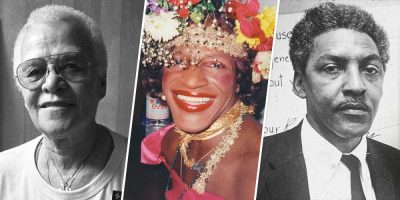 16 queer Black trailblazers who made history. By , and
16 queer Black trailblazers who made history. By , and
From 1960s civil rights activist Bayard Rustin to Chicago’s first lesbian mayor, Lori Lightfoot, Black LGBTQ Americans have long made history with innumerable contributions to politics, art, medicine and a host of other fields. “As long as there have been Black people, there have been Black LGBTQ and same-gender-loving people,” David J. Johns, executive director of the National Black Justice Coalition, told NBC News. “Racism combined with the forces of stigma, phobia, discrimination and bias associated with gender and sexuality have too often erased the contributions of members of our community. Read more
Sports
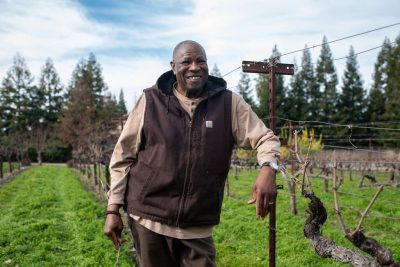 A Manager of a Certain Vintage. By Scott Miller / NYT
A Manager of a Certain Vintage. By Scott Miller / NYT
“Be right back,” Dusty Baker said on a chilly, recent Saturday morning at his home here. The veteran manager had made some final cuts earlier in the week and now it was time to pick up the pieces. When he returned, he did not have a lineup card in hand, nor was a general manager nearby. Instead, he came roaring down a path at the wheel of his trusty Kawasaki Mule, a small all-terrain vehicle. The cuts had come while pruning grape vines. A lockout may be pausing the business of Major League Baseball, but Baker, 72, is still managing. Read more
 All-minority broadcast team makes history with the APGA Tour at Torrey Pines. By Farrell Evans / The Undefeated
All-minority broadcast team makes history with the APGA Tour at Torrey Pines. By Farrell Evans / The Undefeated
Growing up in Los Angeles in the 1970s and ’80s, Golf Channel personality Damon Hack didn’t watch televised golf tournaments. “Golf wasn’t a part of my upbringing,” Hack told The Undefeated. “If golf was on TV, it was because we were waiting for a Lakers game or a football game to come on.” During Hack’s childhood, there was only a smattering of Black players, such as Lee Elder, Calvin Peete and Jim Thorpe, who made it into the two-hour windows of TV coverage that were often the norm before the explosion of golf in the late ’90s with the emergence of Tiger Woods. Nearly all of the announcers were white men and even the commercials had an air of homogeneity. Read more
Site Information
Visit our home page for more articles, book/podcast and video favorites. And at the top of this page register your email to receive notification of new editions of Race Inquiry Digest. Click here for earlier Digests.
About Race Inquiry and Race Inquiry Digest. The Digest is published on Mondays and Thursdays.
Use the buttons below to share the Digest in an email, or post to your Facebook, Linkedin or Twitter accounts.